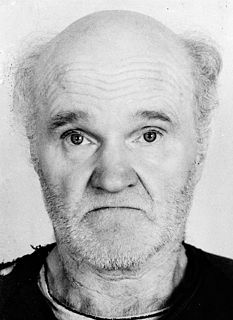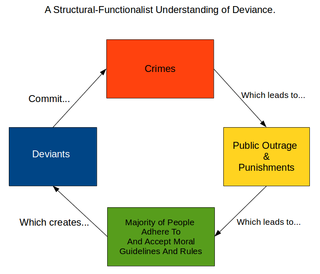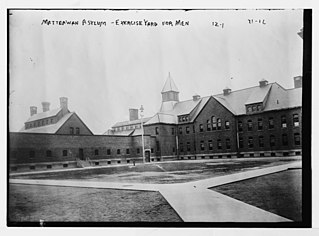The insanity defense, also known as the mental disorder defense, is an affirmative defense by excuse in a criminal case, arguing that the defendant is not responsible for their actions due to an episodic or persistent psychiatric disease at the time of the criminal act. This is contrasted with an excuse of provocation, in which the defendant is responsible, but the responsibility is lessened due to a temporary mental state. It is also contrasted with a finding that a defendant cannot stand trial in a criminal case because a mental disease prevents them from effectively assisting counsel, from a civil finding in trusts and estates where a will is nullified because it was made when a mental disorder prevented a testator from recognizing the natural objects of their bounty, and from involuntary civil commitment to a mental institution, when anyone is found to be gravely disabled or to be a danger to themselves or to others.
Involuntary commitment, civil commitment, involuntary hospitalization or involuntary hospitalisation, is a legal process through which an individual who is deemed by a qualified agent to have symptoms of severe mental disorder is detained in a psychiatric hospital (inpatient) where they can be treated involuntarily. This treatment may involve the administration of psychoactive drugs, including involuntary administration. In many jurisdictions, people diagnosed with mental health disorders can also be forced to undergo treatment while in the community; this is sometimes referred to as outpatient commitment and shares legal processes with commitment.
A psychiatrist is a physician who specializes in psychiatry, the branch of medicine devoted to the diagnosis, prevention, study, and treatment of mental disorders. Psychiatrists are medical doctors and evaluate patients to determine whether their symptoms are the result of a physical illness, a combination of physical and mental ailments or strictly mental issues. Sometimes a psychiatrist works within a multi-disciplinary team, which may comprise clinical psychologists, social workers, occupational therapists, and nursing staff. Psychiatrists have broad training in a bio-psycho-social approach to assessment and management of mental illness.

St. Elizabeths Hospital is a psychiatric hospital in Southeast, Washington, D.C. operated by the District of Columbia Department of Behavioral Health. It opened in 1855 with the name Government Hospital for the Insane, the first federally operated psychiatric hospital in the United States. Housing over 8,000 patients at its peak in the 1950s, the hospital had a fully functioning medical-surgical unit, a school of nursing, accredited internships and psychiatric residencies. Its campus was designated a National Historic Landmark in 1990. The west portion of the campus is home to over 1,000 U.S. Department of Homeland Security personnel and serves as its headquarters. St. Elizabeths Hospital campus also has the joint tenant of the Douglas A. Munro Coast Guard Headquarters Building with hundreds of Coast Guard personnel.

Antti Veikko Ilmari Siltavuori, better known as Jammu Siltavuori or Jammu-setä, was a Finnish murderer and sexual offender.

Forensic psychiatry is a subspeciality of psychiatry and is related to criminology. It encompasses the interface between law and psychiatry. According to the American Academy of Psychiatry and the Law, it is defined as "a subspecialty of psychiatry in which scientific and clinical expertise is applied in legal contexts involving civil, criminal, correctional, regulatory, or legislative matters, and in specialized clinical consultations in areas such as risk assessment or employment." A forensic psychiatrist provides services – such as determination of competency to stand trial – to a court of law to facilitate the adjudicative process and provide treatment, such as medications and psychotherapy, to criminals.

The Serbsky State Scientific Center for Social and Forensic Psychiatry is a psychiatric hospital and Russia's main center of forensic psychiatry. In the past, the institution was called the Serbsky Institute.

Forensic social work is the application of social work to questions and issues relating to law and legal systems. This specialty of the social work profession goes far beyond clinics and psychiatric hospitals for criminal defendants being evaluated and treated on issues of competency and responsibility. A broader definition includes social work practice which in any way is related to legal issues and litigation, both criminal and civil. Child custody issues, involving separation, divorce, neglect, termination of parental rights, the implications of child and spousal abuse, juvenile and adult justice services, corrections, and mandated treatment all fall under this definition. Forensic social worker may also be involved in policy or legislative development intended to improve social justice.

Forensic psychotherapy is the application of psychological knowledge to the treatment of offender-patients who commit violent acts against themselves or others. This form of treatment allows for a therapist to potentially understand the offender and their mental state. It gives the individual providing treatment the opportunity to examine further whether the offender’s criminal behavior was a conscious act or not, what exactly their association with violent behavior is, and what possible motives could have driven them. The discipline of forensic psychotherapy is one that requires the involvement of individuals other than simply the therapist and patient. A therapist may collaborate with other professionals, such as physicians, social workers, and other psychologists in order to best serve the offenders’ needs. Whether the treatment is successful or not relies on a multitude of things, but typically ensuring that a systemic approach is taken and that all involved in the treatment process are well informed and supportive has proven to be the most effective. In addition to group work, forensic psychotherapy may also involve therapeutic communities, individual interaction with victims as well as offenders, and family work. In order for this specialized therapy to be as effective as possible, it demands the compliance of not only the patient and therapist, but of the rest of society as well. The main focus of forensic psychotherapy is to obtain a psychodynamic understanding of the offender in order to attempt to provide them with an effective form of treatment. Guidelines have been set to ensure proficiency in the field of Forensic Psychology.
The forensic Conditional Release Program (CONREP) is the California Department of State Hospitals' statewide system of community-based services for specified forensic patients. It was mandated as a state responsibility by the Governor's Mental Health Initiative of 1984 and began operations on January 1, 1986.

Western State Hospital is a psychiatric hospital located at 9601 Steilacoom Boulevard SW in Lakewood, Washington. Administered by the Washington Department of Social and Health Services (DSHS), it is a large facility with 806 beds, and Washington's second-oldest state-owned enterprise.
Atascadero State Hospital, formally known as California Department of State Hospitals- Atascadero (DSHA), is located on the Central Coast of California, in San Luis Obispo County, halfway between Los Angeles and San Francisco. DSHA is an all-male, maximum-security facility, forensic institution that houses mentally ill convicts who have been committed to psychiatric facilities by California's courts. Located on a 700+ acre grounds in the city of Atascadero, California, it is the largest employer in that town. Due to security measures, DSHA and its grounds are not open to the public, and those wishing to enter the grounds must have a lawful reason to enter. DSHA does not have a medical Emergency Room; those seeking medical assistance should seek a medical hospital. Members of the general public seeking mental health assistance are referred to SLO County Mental Health. DSHA does not take voluntary admissions. The only patients admitted are those that are referred to the hospital by the Superior Court, Board of Prison Terms, or the Department of Corrections.

Florida State Hospital (FSH) is a hospital and psychiatric hospital in Chattahoochee, Florida. Established in 1876, it was Florida's only state mental institution until 1947. It currently has a capacity of 1,042 patients. The hospital's current Administration Building is on the National Register of Historic Places.

Matteawan State Hospital for the Criminally Insane, established in 1892 as the Matteawan State Hospital by an 1892 law, functioned as a hospital for insane criminals. It is located in Matteawan, New York.

Eastern State Hospital is a psychiatric hospital established in 1891 in Medical Lake, a small community 20 miles southwest of Spokane, Washington. The original building was a Kirkbride Plan and the current building has a similar floor plan with male and female wings extending out from the main building.

The Utah State Hospital (USH) is a mental hospital located in eastern Provo, Utah, United States of America. The current superintendent is Dallas Earnshaw.
The Chester Mental Health Center is the only State of Illinois' maximum security forensic mental health facility for those committed via a court order or deemed an escape risk. The facility is operated by the State of Illinois in Chester, Illinois and is a part of the Illinois Department of Human Services, formerly the Illinois Department of Mental Health and Developmental Disabilities. It is adjacent to the Menard Correctional Center. The other secure mental health center in Illinois is Elgin Mental Health Center, which houses women as well as men. Chester Mental Health Center is a men's facility.
Steen Viktor Christensen is a Danish criminal, who was sentenced in Denmark in 1992 to twelve years in prison for numerous bank robberies, hostage taking, and rape. In autumn 1997 Christensen was allowed to go on an unguarded prison furlough, during which he escaped to Finland.

Mental health in Russia is covered by a law, known under its official name—the Law of the Russian Federation "On Psychiatric Care and Guarantees of Citizens' Rights during Its Provision", which is the basic legal act that regulates psychiatric care in the Russian Federation and applies not only to persons with mental disorders but all citizens. A notable exception of this rule is those vested with parliamentary or judicial immunity. Providing psychiatric care is regulated by a special law regarding guarantees of citizens' rights.
Involuntary commitment or civil commitment is a legal process through which an individual with symptoms of severe mental illness is court-ordered into treatment in a hospital (inpatient) or in the community (outpatient).












